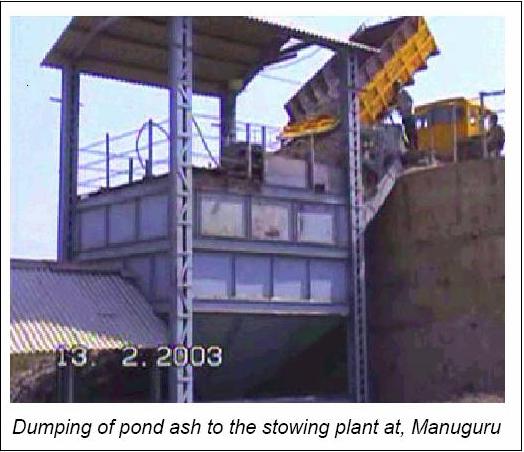FLY ASH UTILISATION

FLY ASH UTILISATION
Heavy Water Board had initiated efforts to achieve full utilization of its fly ash being generated in the captive thermal power plant for its Heavy Water Plant at Manuguru. In this plant, there are 3 steam generators and 3 turbo generators each of 30 MW capacity. These units generate 600-900 tonnes of coal ash every day depending upon the ash content, which varies from 30-45%. As per the current practice, fly ash generated from coal-based power plants is disposed off in ash ponds in the form of wet slurries.
 |
Realizing that major quantity of fly ash could be utilized for stowing, in lieu of sand, which is the present practice, into the underground mines after extraction of coal, the Board initiated a collaboration with Fly Ash Mission of Department of Science and Technology, Government of India, to establish a technology demonstration using pond ash as a stowing material for the underground mines at Manuguru, Andhra Pradesh.
This application, will also help the country in saving precious sand which is needed for important developmental activities, as well as for the conservation of large quantities of water. This activity has a potential of full utilization of fly ash from coal based power plants for many years as the capacity of mines to receive fly ash/pond ash is commensurate with the quantity of coal being extracted.
|
The Heavy Water Board (HWB) has also encouraged local entrepreneurs near the Heavy Water Plant Manuguru, by providing land, water, power, free fly ash for setting up fly ash brick manufacturing units which have been producing quality bricks which are being utilized by mining industry as well as by the public of the nearby villages. It is also exploring to initiate a demonstration project in the field of agriculture for finding acceptance by the farmers for the use of fly ash. Use of fly ash not only increases the yield of the crops but also acts as pesticides for preserving the loss of crops from insects.
Since the fly ash of Manuguru plant has suitable pozzolanic properties, efforts are also being made towards encouraging cement-manufacturing entrepreneurs for using fly ash for manufacture of cement.
Contact: Chief Executive, Heavy Water Board,
V. S. Bhavan, Anushakti Nagar, Mumbai- 400 094.
Phone : 022-25560870 Fax : 022-25563360